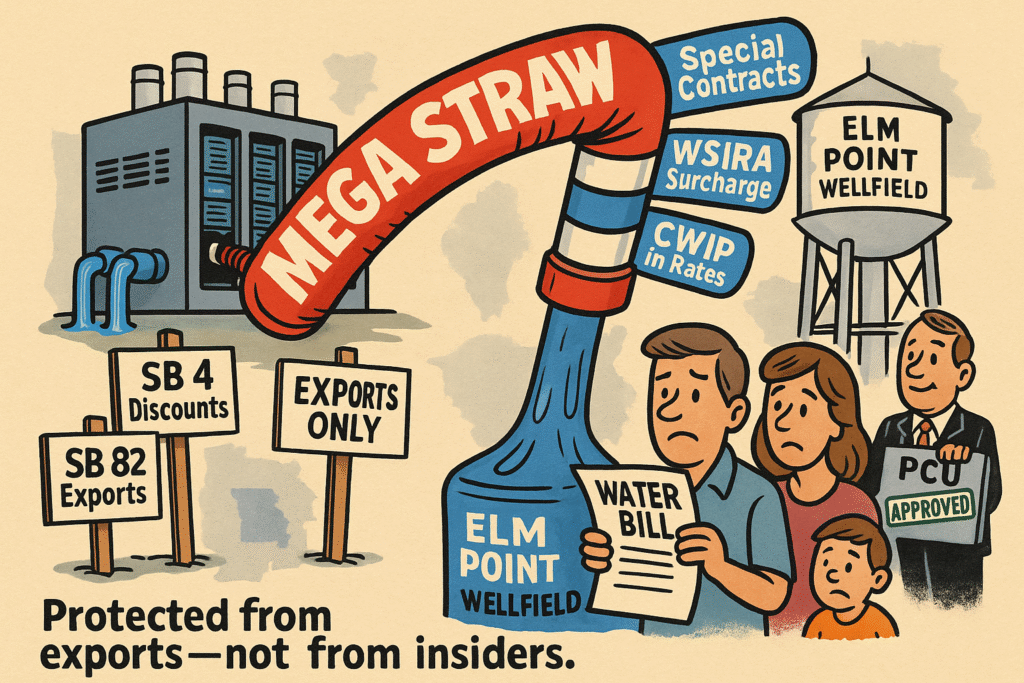
What’s happening in St. Charles? KSDK reports a 440-acre, secretive data-center project is moving ahead on/near a polluted-groundwater wellfield and a protected wetland—sparking local fears about both water quality and a giant new, long-term draw on the same system families use.
The timing. Two brand-new laws—SB 4 (utilities omnibus) and SB 82 (“water preservation”)—take effect Aug. 28, 2025, i.e., this month.
How SB 4 tilts the field toward mega-users and spreads the bill to everyone else
Economic-development discounts for big new gas loads. SB 4 authorizes up to 25% off for a new customer whose load is ≥ 270,000 CCF/year (and 25% for an existing customer’s ≥135,000 CCF/year incremental load)—classic “land the hyperscaler” pricing, with the discount mechanics set in statute. (SB 4, §393.1645.1(1)–(2))
“Special contract” power pricing for large incremental electric load. SB 4 defines “special contract” as electric service under a special incremental-load, fixed-price schedule approved by the commission—another tool used to lock in big users. (SB 4, securitization definitions—“Special contract”)
CWIP: start paying before it’s built—refunds only if the commission later says so. SB 4 lets utilities put construction work in progress (CWIP) into rate base for new gas-generation projects. Any clawbacks happen only “if, and to the extent the commission determines” costs were imprudent or the project isn’t placed in service in time—meaning Missourians can’t count on meaningful refunds after the fact. (SB 4, §393.135.2)
Future-test-year ratemaking for water/sewer (and gas). Beginning July 1, 2026, utilities can set rates on projected costs/plant, then true-up later—facilitating expansion to serve mega-loads. (SB 4, §393.150.3–.8)
WSIRA: a new water/sewer surcharge outside a full rate case. SB 4 creates a Water/Sewer Infrastructure Rate Adjustment (WSIRA)—a running surcharge (capped at 15% of base revenue requirement) to recover “eligible infrastructure” spends between cases. (SB 4, §393.1506.1–.4)
Fast-track supply buildout via IRP pre-approval. SB 4 orders a new integrated resource planning regime; the commission’s IRP order maps the supply-side resources to be built and expedites certificates for them—greasing the skids when a mega-load arrives. (SB 4, §393.1900)
Bottom line on SB 4: It discounts the entry price for very large customers, accelerates expansion to serve them (CWIP, WSIRA, future test years, IRP), and socializes much of the cost/risks onto everybody else.
What SB 82 does—and what it doesn’t
Targets exports, not in-state mega-users. SB 82 creates a permit to export water out of Missouri, with a broad 30-mile border carve-out (reporting only). It defines “beneficial uses” to include industrial—again, in the export context. (SB 82, §640.406.1–.3)
No new cap or permit for in-state withdrawals. SB 82 doesn’t require any statewide permit, limit, or hydrologic review for a large in-state industrial user (like a data center) pumping from a local wellfield. The law “preserves” water from exports, not from insiders. (SB 82, §640.406)
Why this combination is bad news for St. Charles families
- Same finite aquifer, bigger straw. The project would draw from the same local system anchored by the Elm Point wells/treatment plant—an area already tied to past groundwater contamination concerns. Neither law adds local guardrails. (St. Charles MOUS EPASTLPR)
- Subsidize the strain. SB 4’s discounts and fixed-price special contracts help land mega-loads; WSIRA/CWIP/future-test-year make it easier to build the pipes/pumps/plant now and put the tab on ratepayers now. (Cites above.)
- Don’t count on refunds. CWIP refunds happen only if the commission later finds imprudence—and history shows those clawbacks are rare and partial at best. (SB 4, §393.135.2)
Receipts: where to find this in the bills
- Gas EDR discounts (25%; 270k CCF/yr threshold): SB 4, §393.1645.1(1)–(2).
- “Special contract” = fixed-price, special incremental-load electric service: SB 4 (definitions under securitization section).
- CWIP in rate base; refunds only if the commission later determines imprudence or delay: SB 4, §393.135.2.
- Future-test-year ratemaking for gas/water/sewer: SB 4, §393.150.3–.8.
- WSIRA surcharge; 15% cap; not alongside ISRS: SB 4, §393.1506.1–.4.
- IRP (commission-run; resource approvals, expedited CCNs): SB 4, §393.1900.
- Export-only water permit; 30-mile border carve-out; beneficial uses include industrial: SB 82, §640.406.
- Effective dates (this month): SB 4 — Aug. 28, 2025; SB 82 — Aug. 28, 2025.
Conservative, citizen-first course correction for 2026
- Start by repealing SB 4 and SB 82, and shift the advantage back to the Citizens of Missouri—whom legislators took an oath to serve—not to billion-dollar monopoly utilities and their mega-customers.
- No more socialized discounts. If a mega-user gets a deal, ban cross-subsidies; require customer-specific cost-of-service so regular families aren’t backstopping special contracts or EDRs. (SB 4 mechanics: §393.1645; “special contract” definitions.)
- Local-water-first safeguards. Require statewide permits + hydrologic impact reviews for large in-state withdrawals near wellfields/wetlands—before a shovel hits dirt—and mandate conservation/cooling tech that slashes withdrawals.
- Tighten rate recovery. Bar CWIP and WSIRA for projects primarily driven by a single mega-customer unless: (a) there’s documented surplus supply, and (b) the customer (not households) guarantees overrun risks. (SB 4 tools: §393.135; §393.1506; §393.150 future-test-year.)
Sources used
- KSDK reporting on the St. Charles data-center site (440 acres; wetland/wellfield proximity). KSDK+1
- City/EPA context on Elm Point wellfield and contamination response. St. Charles MOUS EPA
- Senate Bill 4
- Senate Bill 82

